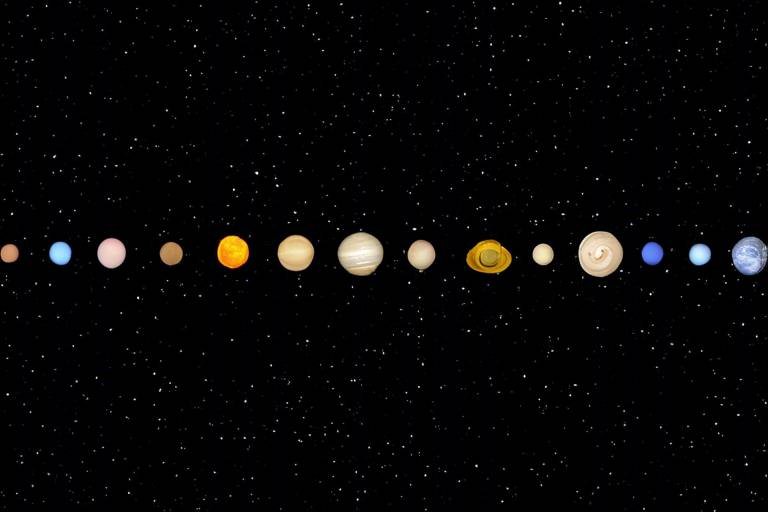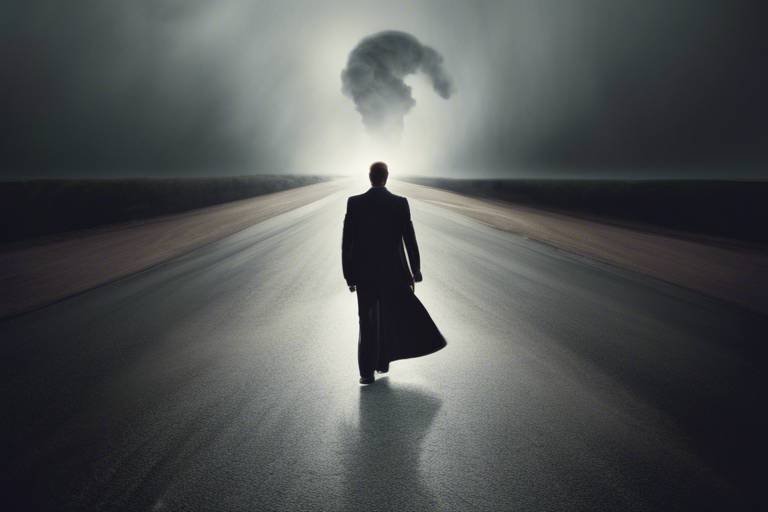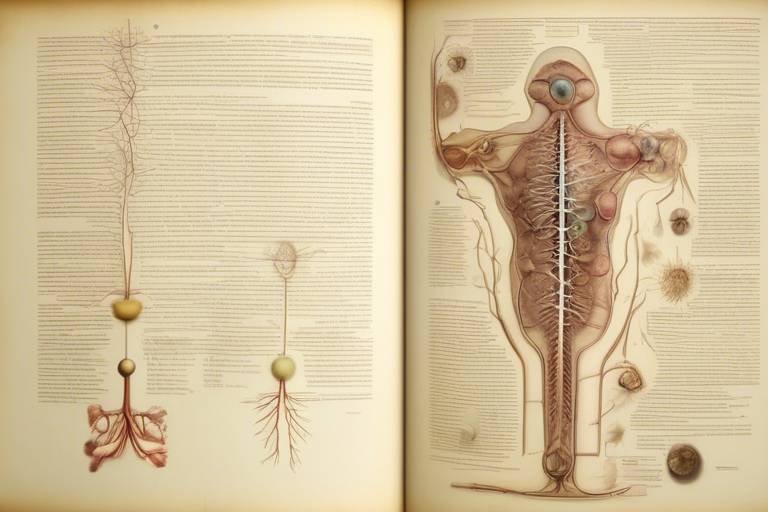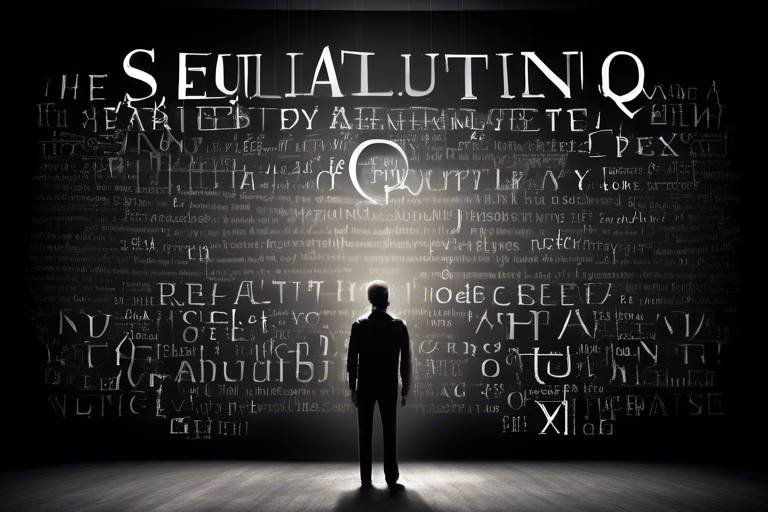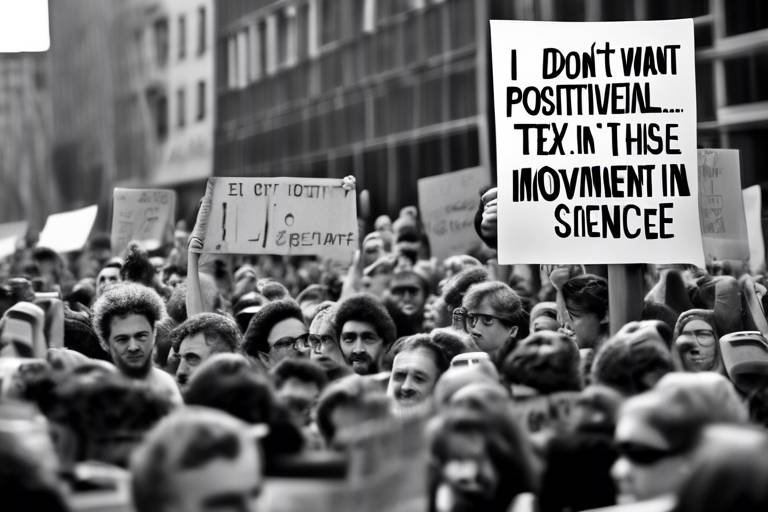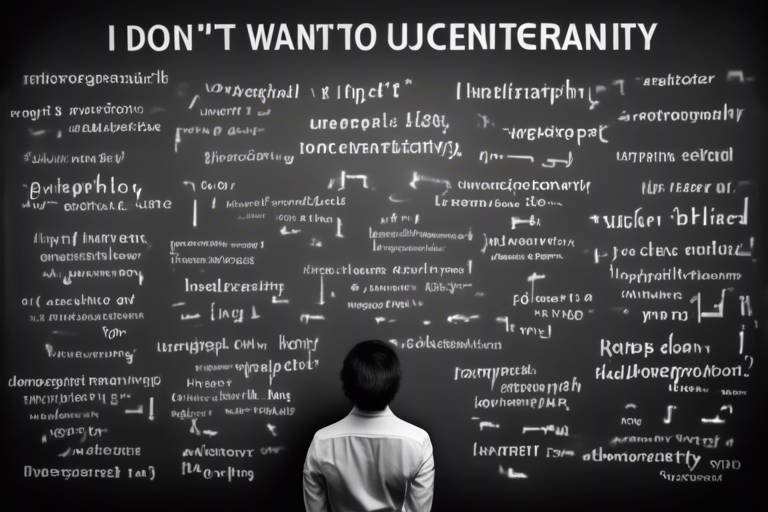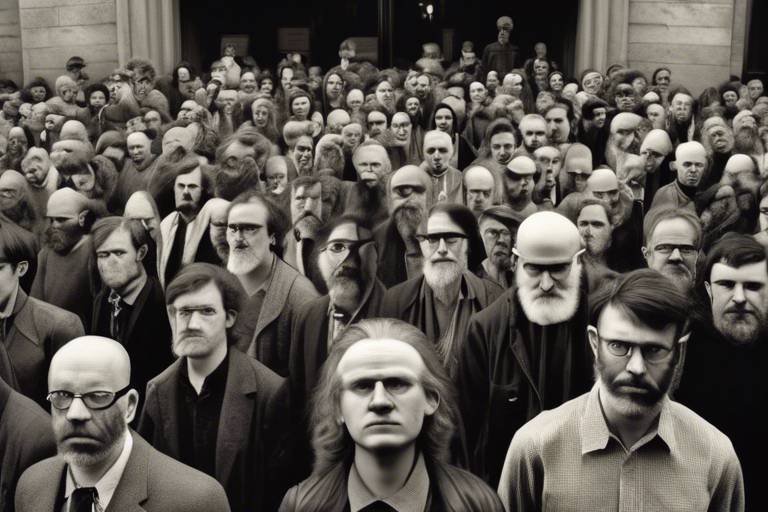Does the Multiverse Theory Challenge Philosophical Mono-Reality?
The concept of a multiverse is not just a mind-boggling idea that you might find in a science fiction novel; it has profound implications that resonate deeply within the realms of philosophy. Imagine a reality where every choice you make spawns a new universe, each one diverging from the last. This tantalizing notion raises a fundamental question: does the multiverse theory challenge our traditional understanding of mono-reality? In this article, we will explore the intricate dance between these two concepts, delving into how multiple universes may reshape our comprehension of existence, reality, and perception.
To grasp the depth of this inquiry, we must first understand what we mean by mono-reality. This philosophical idea suggests that there is a single, unified reality that we all experience. It posits that our perceptions and consciousness are anchored in this singular existence. However, when we introduce the idea of the multiverse, which proposes the existence of potentially infinite universes beyond our observable reality, we find ourselves at a crossroads that begs for exploration.
As we journey through this exploration, we will consider how the multiverse theory not only challenges the notion of a single reality but also invites us to rethink our understanding of existence itself. Could it be that our experiences are just one thread in a vast tapestry of realities? Or does this multitude of universes dilute the essence of what it means to exist? These questions are not merely academic; they touch upon the very fabric of our identity, our choices, and our moral responsibilities.
Throughout history, philosophers have grappled with ideas of reality and existence. Figures like Descartes and Kant laid the groundwork for our understanding of mono-reality, asserting that knowledge and existence are rooted in a singular experience. But what happens when we introduce the multiverse into this dialogue? The implications are staggering, and as we delve deeper, we will uncover the potential conflicts between these theories and how they challenge our foundational beliefs.
In the following sections, we will break down the basics of multiverse theory, explore the historical perspectives on mono-reality, and analyze the philosophical implications that arise when these two concepts collide. Through this journey, we aim to illuminate the complexities of existence and the nature of reality, ultimately asking whether the multiverse theory can coexist with the notion of mono-reality or if it fundamentally disrupts it.
- What is the multiverse theory? The multiverse theory suggests that there are multiple, potentially infinite universes that exist parallel to our own, each with its own unique characteristics.
- How does mono-reality differ from multiverse theory? Mono-reality posits that there is a single, unified reality, while multiverse theory proposes the existence of many realities that coexist.
- What are the implications of the multiverse on free will? The existence of multiple universes may complicate traditional views on free will, leading to questions about choice and agency across different realities.
- Can mono-reality and multiverse theory coexist? This is a central question of the article, as we explore whether these two concepts can be integrated or if they inherently conflict with one another.

The Basics of Multiverse Theory
The multiverse theory is one of those mind-bending concepts that can make you feel like you're living in a sci-fi movie. At its core, it suggests that our universe is just one of many, perhaps even an infinite number of universes that coexist simultaneously. This idea isn't just a wild fantasy; it has roots in serious scientific disciplines like quantum physics and cosmology. Imagine standing on a beach and looking out at the ocean—each wave represents a different universe, all crashing into the shore of reality, yet each wave is distinct and separate from the others.
The origins of multiverse theory can be traced back to various interpretations of quantum mechanics. One of the most famous interpretations is the Many-Worlds Interpretation, proposed by physicist Hugh Everett III in the 1950s. This interpretation posits that every time a quantum event occurs, the universe splits into multiple branches, creating a new universe for each possible outcome. It’s as if every decision you make spawns a new reality where different choices play out. So, next time you wonder about the road not taken, remember—there's a universe where you made that choice!
Furthermore, the concept of the multiverse isn't limited to quantum mechanics. It also finds a place in cosmological theories, particularly in the context of cosmic inflation. This theory suggests that during the early moments of the Big Bang, our universe underwent rapid expansion, which could have led to the creation of other universes in a process akin to bubbles forming in boiling water. Each bubble could represent a different universe, with its own set of physical laws and constants, leading to a diverse array of realities.
To summarize, the multiverse theory proposes a reality that is far richer and more complex than our everyday experiences suggest. Here’s a quick recap of its key components:
- Many-Worlds Interpretation: Every quantum event creates a new universe.
- Cosmic Inflation: Rapid expansion of the universe may lead to the formation of multiple universes.
- Infinite Possibilities: Each universe could have different physical laws and constants.
As we delve deeper into the implications of multiverse theory, it becomes clear that it challenges our traditional notions of existence and reality. It raises profound questions: If there are countless versions of ourselves living in parallel universes, what does that mean for our understanding of identity and existence? Can we truly claim to know our reality if there are infinite others out there? These questions not only intrigue scientists but also philosophers, as they navigate the complex interplay between science and philosophy.
In the upcoming sections, we will explore how this theory interacts with the philosophical concept of mono-reality, examining whether these two ideas can coexist or if they are destined to conflict. Buckle up; it’s going to be a fascinating journey through the realms of existence and perception!

Understanding Mono-Reality in Philosophy
When we dive into the intricate world of philosophy, one concept that often stands out is mono-reality. This idea suggests that there is a single, unified reality that shapes our understanding of existence and consciousness. It’s like looking through a keyhole into a vast room; what we see is limited, yet we believe it represents the entirety of the space. This perspective has deep historical roots, with thinkers like Descartes and Kant laying the groundwork for how we perceive reality.
Mono-reality posits that despite the multitude of experiences and perceptions we encounter, there exists a singular truth that governs our understanding of the universe. This notion can be likened to a canvas—each brushstroke represents individual experiences, but all contribute to a single masterpiece. Philosophers argue that this singularity is crucial for our grasp of knowledge, existence, and consciousness. If we were to entertain the idea of multiple realities, we might find ourselves questioning the validity of our experiences and perceptions.
To comprehend mono-reality fully, we must explore its historical context. For instance, Descartes famously declared, "Cogito, ergo sum" (I think, therefore I am). This statement emphasizes the idea that the act of thinking is proof of one's existence, reinforcing the concept of a unified reality experienced through individual consciousness. In contrast, Kant's transcendental idealism suggests that our understanding of reality is shaped by our perceptions, yet still anchors itself to the idea of a single, coherent reality that we all share.
In this philosophical landscape, mono-reality serves as a foundation for various discussions about existence and knowledge. It leads us to ponder essential questions: What does it mean to exist? How do we define consciousness? And, importantly, how do our perceptions shape our understanding of the world around us? These inquiries are crucial as they delve into the essence of what it means to be human.
However, as we explore these concepts, we must also acknowledge the limitations they impose. The idea of mono-reality can sometimes feel restrictive, as it doesn’t account for the vastness of human experience. Just as a single photograph can capture a moment, it cannot encompass the entire story of a life lived. This is where the multiverse theory enters the conversation, challenging the very fabric of mono-reality and inviting us to reconsider our understanding of existence.
In summary, while mono-reality offers a coherent framework for understanding existence and consciousness, it also raises questions about the nature of reality itself. As we continue to explore these philosophical ideas, we must remain open to the possibility that our understanding of reality is far more complex than we initially believed.
- What is mono-reality? Mono-reality is the philosophical concept that suggests there is a single, unified reality that shapes our understanding of existence and consciousness.
- How does Descartes contribute to the idea of mono-reality? Descartes’ famous dictum "Cogito, ergo sum" emphasizes that the act of thinking confirms one’s existence, supporting the notion of a singular reality.
- What is the significance of Kant's transcendental idealism? Kant’s theory posits that our understanding of reality is shaped by our perceptions, reinforcing the idea of a shared, coherent reality.
- How does the multiverse theory challenge mono-reality? The multiverse theory introduces the possibility of multiple realities, which complicates the notion of a single, unified existence.

Historical Perspectives on Mono-Reality
The concept of mono-reality has been a cornerstone of philosophical inquiry for centuries, shaping how we understand existence and consciousness. To appreciate its depth, we must look back at the contributions of influential philosophers throughout history. These thinkers have laid the groundwork for the idea that there is a single, coherent reality that we all share, despite the complexities of perception and interpretation.
One of the earliest and most significant figures in this discussion is René Descartes, who famously declared, "Cogito, ergo sum" (I think, therefore I am). This assertion underscores the belief that the act of thinking is proof of one's existence and serves as a foundation for knowledge. Descartes posited that our thoughts, while subjective, are rooted in a singular reality that can be understood through reason. He argued that the mind and body, although distinct, interact within this unified reality, prompting us to question the nature of existence itself. His dualistic approach laid the groundwork for later discussions on the relationship between consciousness and reality.
Another pivotal figure is Immanuel Kant, whose philosophy introduced the idea of transcendental idealism. Kant proposed that our understanding of the world is shaped by our sensory experiences and cognitive faculties. He argued that while we may perceive the world through our senses, the underlying reality is structured by our minds. This perspective reinforces the notion of a singular reality, as Kant believed that the categories of understanding we possess are universal. In his view, even though individuals may experience reality differently, they are still engaging with the same fundamental existence.
To further illustrate the historical perspectives on mono-reality, we can consider the following table, which highlights key philosophers and their contributions:
| Philosopher | Key Contribution | Philosophical Viewpoint |
|---|---|---|
| René Descartes | "Cogito, ergo sum" | Dualism - Mind and body as distinct yet interacting |
| Immanuel Kant | Transcendental Idealism | Reality is shaped by human perception and understanding |
| David Hume | Empiricism | Knowledge derives from sensory experience, questioning certainty |
| Georg Wilhelm Friedrich Hegel | Dialectical Method | Reality is a dynamic process of thesis, antithesis, and synthesis |
As we delve deeper into these historical perspectives, it's clear that the discussions around mono-reality are not just academic exercises; they have profound implications for how we perceive our existence. Each philosopher, in their own way, challenged us to consider the nature of reality and our place within it. Whether through Descartes' foundational thinking or Kant's emphasis on perception, the dialogue surrounding mono-reality has evolved, yet remains a vital part of philosophical discourse.
In conclusion, understanding the historical perspectives on mono-reality not only enriches our comprehension of philosophy but also invites us to reflect on our own experiences of reality. As we explore the implications of the multiverse theory, we must consider how these foundational ideas may be challenged or reinforced in light of new scientific discoveries and philosophical inquiries.
- What is mono-reality? Mono-reality refers to the philosophical concept that there is a single, unified reality that exists, which can be understood through reason and perception.
- How does the multiverse theory challenge mono-reality? The multiverse theory suggests the existence of multiple, potentially infinite universes, which raises questions about the uniqueness of our reality and the nature of existence itself.
- Who are the key philosophers associated with mono-reality? Key philosophers include René Descartes, Immanuel Kant, David Hume, and Georg Wilhelm Friedrich Hegel, each contributing unique perspectives on existence and reality.
- What are the implications of these theories for free will? The existence of multiple universes may complicate traditional views on free will, prompting deeper questions about choice and identity across different realities.

Descartes and the Nature of Existence
René Descartes, a pivotal figure in the history of philosophy, famously declared, "Cogito, ergo sum", which translates to "I think, therefore I am." This profound statement encapsulates the essence of his exploration into the nature of existence. Descartes posited that the very act of doubt or thought is proof of one's existence. In a world where perceptions can be deceiving, he sought a foundation that was undeniably true. This quest led him to establish a singular reality based on self-awareness and consciousness.
For Descartes, the mind held a unique position; it was the only thing he could be certain of. Everything else, including the physical world, was open to skepticism. This notion challenges the idea of multiple realities. If we entertain the possibility of a multiverse, where countless variations of existence play out simultaneously, how does that affect Descartes' assertion? Can we still claim that our thoughts are the ultimate proof of our existence if there are infinite versions of ourselves, each with their own thoughts and experiences?
Furthermore, Descartes’ dualism—the separation of mind and body—adds another layer to the discussion. He argued that the mind is a non-material entity that interacts with the physical body. In a multiverse context, this raises intriguing questions about identity and continuity. If there are parallel universes, are there also parallel minds? Do we maintain a singular essence across these realities, or do we become fragmented versions of ourselves, each shaped by different choices and circumstances?
To grasp the implications of Descartes' philosophy in light of multiverse theory, we might consider the following:
- Existence as Consciousness: If existence is tied to conscious thought, how does this apply when consciousness is multiplied across various universes?
- Identity and Continuity: Does the essence of 'self' remain intact when there are potentially infinite versions of oneself?
- Knowledge and Reality: How does the existence of multiple realities challenge our understanding of what is true and real?
Ultimately, Descartes’ exploration of existence invites us to ponder profound questions about the nature of reality. As we delve into the multiverse theory, we must grapple with whether our singular experience can hold true when faced with the vastness of infinite possibilities. Are we simply one of many thoughts in a grand cosmic mind, or does our unique consciousness grant us a distinct reality? The interplay between Descartes' philosophy and the multiverse theory opens a rich dialogue about existence, identity, and what it truly means to be.

Cogito, ergo sum
This article explores the implications of the multiverse theory on the concept of mono-reality in philosophy, examining how multiple universes may alter our understanding of existence, reality, and perception.
The multiverse theory is a fascinating concept that has its roots in quantum physics and cosmology. It suggests that beyond our observable universe, there exist multiple, potentially infinite universes. Imagine a vast cosmic ocean where each wave represents a different universe, each with its own unique laws of physics and realities. This theory has gained traction among scientists and philosophers alike, as it challenges the very fabric of what we consider to be "real."
Mono-reality, on the other hand, is a philosophical concept that posits the existence of a single, unified reality. This notion has been pivotal in shaping our understanding of existence, consciousness, and the nature of reality itself. When we think about mono-reality, we often envision a world where our perceptions and experiences are singular and consistent. But what happens when we introduce the idea of multiple realities?
Throughout history, philosophers have grappled with the idea of mono-reality. Figures like René Descartes and Immanuel Kant have made significant contributions to this discussion, shaping our understanding of knowledge and existence from a singular perspective. Their works provide a foundation for exploring how the introduction of multiverse theory could alter these long-held beliefs.
René Descartes famously stated, "Cogito, ergo sum", which translates to "I think, therefore I am." This statement encapsulates the essence of mono-reality, suggesting that the act of thinking is proof of one's existence. Descartes' philosophy implies that our understanding of reality is rooted in individual consciousness. If we consider the multiverse theory, however, we must ask ourselves: does this singular act of thinking still hold true when there are countless versions of ourselves existing in parallel universes? This raises profound questions about the nature of existence and whether our thoughts are unique to our reality or shared across different dimensions.
Immanuel Kant's theory of transcendental idealism also reinforces the idea of a singular reality. Kant argued that our understanding of the world is shaped by our perceptions, which are inherently subjective. In his view, reality is filtered through our senses, creating a unified experience of existence. Yet, if we entertain the possibility of the multiverse, we must reconsider whether our perceptions are truly singular or if they could diverge across multiple realities. This invites a fascinating dialogue about how knowledge and reality are constructed and perceived.
The introduction of the multiverse theory complicates the notion of mono-reality. It challenges the uniqueness of our universe and forces us to rethink the nature of existence itself. If there are infinite versions of reality, how do we define what is "real"? This philosophical conundrum opens up new avenues for exploration, inviting us to consider the implications for identity, free will, and moral responsibility.
As we delve deeper into the philosophical conflicts that arise from considering both multiverse theory and mono-reality, we encounter complex questions about free will, identity, and the essence of existence.
One of the most intriguing aspects of the multiverse theory is its potential impact on our understanding of free will. If multiple universes exist, each with different outcomes based on individual choices, what does this mean for our sense of agency? Are we truly making choices, or are we simply following a predetermined path that branches into various realities? This dilemma invites a re-examination of the relationship between free will and determinism, challenging the very core of our understanding of personal agency.
Moreover, the concept of identity becomes increasingly complex in the context of the multiverse. If there are countless versions of ourselves living in parallel universes, how do we define our sense of self? Is our identity tied to a singular existence, or can it be fluid across different realities? This exploration of identity raises profound questions about continuity and the essence of who we are.
In conclusion, the multiverse theory and mono-reality present fascinating yet conflicting perspectives on existence and reality. While mono-reality offers a cohesive understanding of our experiences, the multiverse theory introduces complexities that challenge this singular viewpoint. As we navigate these philosophical waters, we must consider how these theories can coexist or conflict, ultimately reshaping our understanding of existence and the human experience.
- What is the multiverse theory? The multiverse theory posits the existence of multiple, potentially infinite universes beyond our observable reality, each with its own unique laws and properties.
- How does mono-reality differ from multiverse theory? Mono-reality asserts that there is a single, unified reality, while multiverse theory suggests that there are countless realities existing simultaneously.
- What are the implications of the multiverse for free will? The multiverse theory raises questions about free will by suggesting that every choice may lead to different outcomes in parallel universes, complicating our understanding of agency.
- Can mono-reality and multiverse theory coexist? While they present conflicting views, both theories can coexist in philosophical discussions, prompting deeper explorations of existence and reality.

and its relevance to the idea of a single, unified reality as the foundation of knowledge and existence.
René Descartes, often hailed as the father of modern philosophy, introduced a profound idea that has reverberated through the annals of philosophical thought: Cogito, ergo sum, which translates to "I think, therefore I am." This statement serves as the cornerstone of his philosophy, emphasizing the importance of doubt and questioning as the pathway to certainty. Descartes argued that the very act of thinking is proof of one's existence, suggesting that our consciousness is the foundation upon which reality is built. In a world where perceptions can be deceiving, this assertion highlights the significance of a singular, unified reality as a basis for knowledge and existence.
By asserting that our thoughts affirm our existence, Descartes implies that there is a consistent, underlying reality that can be trusted. This perspective aligns with the notion of mono-reality, where the universe is seen as a singular entity governed by universal laws. For Descartes, the existence of a reliable reality is crucial for the acquisition of knowledge. If reality were fragmented or multifaceted, as posited by the multiverse theory, the certainty of knowledge would be undermined. Imagine trying to build a house on a foundation of shifting sands; the result would be instability and uncertainty. Similarly, if our understanding of existence is based on a myriad of conflicting realities, the quest for knowledge becomes increasingly complex and elusive.
Moreover, Descartes’ dualism, which distinguishes between mind and body, further emphasizes the importance of a unified reality. He proposed that while the mind is distinct and separate from the physical world, both interact within a singular realm of existence. This interaction suggests that despite our subjective experiences and thoughts, there is an objective reality that remains constant, forming the bedrock of our understanding. In essence, Descartes’ philosophy champions the idea that recognizing a unified reality not only enhances our comprehension of existence but also fortifies the pursuit of knowledge.
In light of the multiverse theory, one might question whether Descartes’ assertions still hold weight. If there are infinite universes, each with its own distinct set of realities, how can we claim to have a singular understanding of existence? This conundrum challenges the very essence of Descartes' philosophy and invites us to reconsider our definitions of knowledge and reality. Are we merely observers in a vast, chaotic cosmos, or is there a thread of unity that connects all possible realities? These questions may seem daunting, but they are essential in navigating the philosophical landscape shaped by both Descartes and the multiverse theory.
- What is the multiverse theory? The multiverse theory suggests that there are multiple, potentially infinite universes that exist parallel to our own, each with its own unique laws of physics and realities.
- How does Descartes' philosophy relate to the multiverse theory? Descartes' philosophy emphasizes a singular, unified reality as the foundation of knowledge, which contrasts with the multiverse theory's implication of multiple, diverse realities.
- Can mono-reality and multiverse theory coexist? While they may seem contradictory, some philosophers argue that they can coexist by suggesting that our understanding of reality may be more complex than a simple binary choice.
- What are the implications of the multiverse theory on free will? The existence of multiple universes may complicate traditional views of free will, as it raises questions about the nature of choice and agency across different realities.

Kant’s Transcendental Idealism
Immanuel Kant, a pivotal figure in Western philosophy, introduced the concept of transcendental idealism in the late 18th century, fundamentally altering our understanding of knowledge and reality. At the heart of Kant's philosophy lies the assertion that our perception of the world is not a direct reflection of reality itself but rather a construct shaped by our cognitive faculties. He argued that while we can know phenomena—the things as they appear to us—we cannot access the noumena, or things-in-themselves, which exist independently of our perception.
Kant's theory posits that our experiences are filtered through the lens of our senses and understanding, creating a subjective reality that can differ vastly from the objective reality that might exist outside of our consciousness. This idea raises fascinating questions about the nature of existence and the limits of human understanding. For instance, if our reality is merely a representation shaped by our minds, how can we claim to know anything about the universe in its entirety?
To illustrate this concept, consider the analogy of a camera lens. Just as a camera captures an image through its lens, which can distort or enhance certain features, our minds interpret sensory information in ways that may not accurately reflect the true nature of reality. Kant believed that this subjective experience is governed by a set of innate categories of understanding, which include concepts like space, time, and causality. These categories help us organize our experiences but also limit our ability to access the full scope of existence.
Furthermore, Kant's transcendental idealism emphasizes the role of the observer in shaping reality. He famously stated, "The human understanding is the source of all our principles." This notion suggests that reality is not just a passive backdrop for our experiences but is actively constructed through our perceptions and interpretations. As such, it challenges the idea of a single, unified reality, opening the door to discussions about the multiverse and the potential for multiple, coexisting realities.
In summary, Kant’s transcendental idealism invites us to reconsider the foundations of knowledge and existence. It suggests that our understanding of reality is inherently limited and shaped by our cognitive processes, which raises profound implications for the concept of mono-reality. As we delve deeper into the philosophical implications of the multiverse theory, Kant's ideas serve as a crucial touchstone, reminding us that our grasp of reality is not as straightforward as it may seem.
- What is transcendental idealism?
Transcendental idealism is a philosophical theory proposed by Immanuel Kant, which argues that our understanding of reality is shaped by our cognitive faculties, meaning we can only know things as they appear to us, not as they are in themselves.
- How does Kant's philosophy relate to the multiverse theory?
Kant's philosophy suggests that our perception shapes our reality, which can be seen as a precursor to discussions about the multiverse, where multiple realities may exist beyond our perception.
- What are the implications of Kant's ideas on free will?
Kant's ideas challenge traditional views of free will by suggesting that our decisions are influenced by our perceptions and understanding of reality, potentially complicating notions of moral responsibility.

Philosophical Implications of the Multiverse
The multiverse theory, with its tantalizing proposition of countless universes existing alongside our own, challenges the very foundations of mono-reality in profound ways. Imagine stepping into a vast library, each book representing a different universe, filled with stories that range from almost identical to our own to wildly divergent narratives. This concept forces us to reconsider what we understand about existence, reality, and even our own identities. If multiple realities exist, then what does that mean for our unique experiences and perceptions? Are we truly singular beings in a one-of-a-kind universe, or are we merely one version of ourselves among countless others?
One of the most striking implications of the multiverse theory is its impact on the notion of uniqueness. Traditionally, philosophy has posited that our universe is the only one that matters, the only one where our actions and decisions hold weight. However, if there are infinite universes, each with its own variations of events and outcomes, the significance of our choices comes into question. For instance, if there exists a universe where every possible decision we could make has been played out, does that diminish the value of our current choices? Are they any less meaningful if they are just one thread in a vast tapestry of possibilities?
Moreover, the multiverse theory invites us to reconsider the nature of identity. If we accept that there are parallel universes where alternate versions of ourselves exist, we must ask: which version is the 'real' us? Are we defined by our experiences and choices in this universe alone, or do the lives of our counterparts in other realities influence our identity? This could lead to a fragmented sense of self, where one grapples with the idea of multiple identities coexisting simultaneously. The philosophical implications are staggering, as they challenge the very essence of what it means to be human.
Furthermore, we must explore how the multiverse theory intersects with existential questions. If every possible scenario plays out in some universe, what does that say about fate and destiny? Are we simply actors in a cosmic play, with our roles predetermined by the infinite possibilities of existence? This notion can be both liberating and daunting. On one hand, it suggests a sense of freedom in our choices; on the other, it raises existential dilemmas about the nature of our reality and purpose.
As we delve deeper into these philosophical implications, it becomes clear that the multiverse theory does not just challenge mono-reality but enriches our understanding of existence itself. It invites us to ponder the complexities of reality, urging us to embrace a more nuanced perspective of our place in the cosmos. The conversation is far from over, and as we continue to explore these ideas, we may find that the multiverse offers not just questions, but also new avenues for understanding our own lives and the universe we inhabit.

Potential Conflicts Between Theories
The clash between multiverse theory and the philosophical concept of mono-reality presents a fascinating landscape of ideas that challenge our understanding of existence and reality. At first glance, the notion of multiple universes, each with its own set of rules and possibilities, seems to contradict the idea of a singular, unified reality. This conflict raises profound questions about our perception of the universe, our place within it, and the very essence of our identity.
One of the most significant areas of conflict arises in the realm of free will and determinism. If we accept that multiple universes exist, each branching off from different decisions and events, we must grapple with the implications for our sense of agency. Are our choices truly ours, or are they merely one thread in a vast tapestry of possibilities? This leads us to ponder: if every choice we make spawns a new universe, does that mean our sense of responsibility is diluted across countless realities? In essence, the existence of a multiverse could imply that every decision we face has already been made in some parallel universe, challenging the very foundation of personal accountability.
Moreover, the multiverse theory complicates our understanding of personal identity. Imagine a world where every conceivable version of yourself exists simultaneously, each making different choices and leading distinct lives. This raises the question: which version of you is the "real" one? Are we defined by our choices, or is there an essence that transcends the myriad of experiences we may have in different universes? The implications for self-continuity are staggering, forcing us to reconsider the nature of who we are in a reality where infinite versions of ourselves exist.
To illustrate these conflicts, consider the following table that summarizes key differences between mono-reality and multiverse theory:
| Aspect | Mono-Reality | Multiverse Theory |
|---|---|---|
| Existence | Single universe, singular existence | Multiple universes, each with its own existence |
| Free Will | Choices shape a single reality | Choices create branching realities |
| Identity | Unified self across time | Multiple selves across universes |
| Knowledge | Knowledge is absolute within a single reality | Knowledge varies across different universes |
As we delve deeper into these philosophical implications, it becomes clear that the multiverse theory challenges our long-held beliefs about existence and reality. It compels us to reconsider the nature of our decisions, the essence of our identity, and the very fabric of moral responsibility. The potential conflicts between these two theories not only enrich our understanding of philosophy but also prompt us to explore the boundaries of human thought and perception.
- What is the multiverse theory? The multiverse theory suggests that there are multiple, possibly infinite, universes that exist parallel to our own, each with its own unique properties and realities.
- How does mono-reality differ from multiverse theory? Mono-reality posits a single, unified existence, while multiverse theory allows for countless variations of reality based on different choices and events.
- What are the implications for free will? If multiple universes exist, our choices may lead to different outcomes in parallel realities, challenging the traditional understanding of free will and personal responsibility.
- How does the multiverse affect personal identity? The existence of multiple versions of oneself in different universes raises questions about which version is the "real" one and how we define our identity.

Free Will and Determinism
The debate between free will and determinism has been a cornerstone of philosophical inquiry for centuries. At its core, this discussion grapples with whether our choices are genuinely ours or if they are predetermined by a series of factors beyond our control. With the introduction of the multiverse theory, this age-old debate takes on new dimensions, challenging our understanding of agency and responsibility.
Imagine, for a moment, that every decision you make creates a ripple effect, spawning alternate realities where different choices lead to different outcomes. This notion is at the heart of the multiverse theory, suggesting that for every possible action, there exists a universe where that action has been taken. It's almost like a cosmic game of "what if?" But how does this affect our perception of free will?
In a deterministic framework, every event, including human actions, is the result of preceding events in accordance with the laws of nature. If we accept this view, then our choices might be seen as mere illusions, shadows cast by a predetermined path. However, the multiverse theory complicates this picture:
- Does the existence of multiple outcomes mean that we have genuine choices?
- If every choice spawns a new universe, are we truly free, or are we simply players in a larger, predetermined game?
These questions lead us to reconsider the nature of identity and responsibility. If there are countless versions of ourselves making different choices in parallel universes, what does that say about the decisions we make in this reality? Are we accountable for our actions, or are they just one of many possible paths we could have taken?
Furthermore, the implications of multiverse theory on free will extend into the realm of moral responsibility. If every decision leads to a new universe, can we hold individuals accountable for their choices, knowing that alternate versions of themselves may have made entirely different decisions? This brings us to a crucial point: the essence of what it means to be human. Are we defined by the choices we make, or are we merely reflections of infinite possibilities?
In conclusion, the intersection of free will and determinism in light of the multiverse theory presents a profound philosophical puzzle. As we navigate through these complex ideas, it becomes clear that our understanding of existence, choice, and responsibility may need to evolve. The multiverse invites us to ponder not just what we choose, but the very nature of choice itself.
- What is the multiverse theory? The multiverse theory suggests that there are multiple, potentially infinite universes that exist parallel to our own, each with different outcomes and realities.
- How does the multiverse theory affect our understanding of free will? It challenges the traditional view of free will by proposing that every choice creates alternate realities, raising questions about agency and responsibility.
- Can we be held accountable for our actions in a multiverse? This is a complex issue; if every decision leads to a new universe, it complicates the notion of moral responsibility.

The Nature of Identity
The concept of identity is a fascinating and complex topic, especially when we throw the multiverse theory into the mix. Traditionally, identity has been viewed as a singular, coherent entity—what makes you, *you*. However, when we entertain the idea of multiple universes existing simultaneously, our understanding of personal identity begins to unravel like a tightly wound ball of yarn. Imagine for a moment that every decision you make creates a branching path, leading to countless versions of yourself in parallel universes. Each of these versions experiences life differently based on the choices made, yet they all share the same origin. This raises profound questions: If there are infinite versions of you, which one is the 'real' you? Can we still claim a unique identity when so many alternatives exist?
To illustrate this, consider the following scenarios that might unfold across different universes:
- Scenario A: You chose to pursue a career in art, becoming a renowned painter.
- Scenario B: You opted for a corporate job, climbing the corporate ladder and achieving financial success.
- Scenario C: You decided to travel the world, becoming a digital nomad and experiencing diverse cultures.
Each of these scenarios represents a different version of you, shaped by the choices made at critical junctures in life. Yet, they all originate from the same individual. This leads us to ponder: does each version possess a distinct identity, or are they merely variations of a single self? The multiverse theory suggests that identity might not be as fixed as we once thought, but rather a fluid concept that adapts and changes across different realities.
Furthermore, the implications of this fluidity extend to our understanding of continuity and memory. If you were to meet your alternate self in another universe, would you recognize them? Would they share your memories, or would they have a completely different set of experiences? This divergence raises questions about the essence of identity—what truly defines us? Is it our memories, experiences, or perhaps our choices? In a multiverse where every decision creates a new path, the traditional notion of identity as a singular, unchanging entity becomes increasingly problematic.
Philosophers have long debated the nature of identity, with theories ranging from psychological continuity to physical continuity. However, the multiverse theory challenges these frameworks, suggesting that identity might be more about the connections between different versions of ourselves rather than a singular narrative. In this light, we may need to redefine identity not as a standalone concept but as a tapestry woven from countless threads—each thread representing a different choice, a different experience, and a different universe.
In conclusion, the nature of identity in the context of the multiverse invites us to rethink everything we thought we knew. It encourages us to embrace the complexity of our existence and acknowledge that while we may have a core self, that self is multifaceted and ever-evolving across the vast expanse of reality. As we continue to explore these philosophical implications, we might find that our identities are not just confined to one universe but are instead part of a grander narrative that spans across many.
- What is the multiverse theory? The multiverse theory suggests that there are multiple, potentially infinite universes that exist parallel to our own, each with different variations of reality.
- How does the multiverse theory affect our understanding of identity? It challenges the traditional notion of a singular identity by proposing that multiple versions of ourselves exist across different universes, each shaped by different choices.
- Can identity be defined in a multiverse? Yes, but it requires a rethinking of identity as a fluid and multifaceted concept rather than a fixed entity.
- What philosophical implications arise from the multiverse theory? It raises questions about free will, moral responsibility, and the uniqueness of our existence, challenging long-held beliefs in philosophy.

Conclusion: Bridging the Theories
In wrapping up our exploration of the multiverse theory and mono-reality, it's clear that these concepts, while seemingly at odds, can actually coexist in intriguing ways. The multiverse theory, with its tantalizing proposition of infinite realities, challenges our traditional understanding of existence and perception. It invites us to ponder questions like, "What does it mean to exist?" and "Is our reality the only one that matters?" This shift in perspective can be both exhilarating and disorienting.
On one hand, the multiverse theory suggests that our universe is just one of many, each with its own distinct laws of physics and outcomes. This idea can feel like a cosmic explosion of possibilities, where every choice we make could lead to an entirely different version of ourselves existing in another universe. Imagine standing at a crossroads, and every path you could take branches off into a new universe where different versions of you live out different lives. It's a dizzying thought!
On the other hand, the concept of mono-reality grounds us in the belief that there is a singular, shared reality that we all experience. This perspective is steeped in philosophical traditions that emphasize the importance of a unified existence. Think of it as a sturdy anchor in the ocean of possibilities that the multiverse presents. It provides a framework for understanding consciousness, knowledge, and moral responsibility within a singular context.
So, how do we bridge these two theories? One potential pathway is to view the multiverse not as a negation of mono-reality, but as a broader canvas on which our singular reality is painted. Each universe could represent variations of existence rather than outright contradictions. This perspective allows us to appreciate the richness of our experiences while acknowledging the vastness of potential realities that lie beyond our perception.
Ultimately, the dialogue between these theories enriches our understanding of existence. It encourages us to remain curious and open-minded about the nature of reality. As we continue to explore these profound questions, we must also recognize the philosophical implications for humanity. How we interpret our existence, our choices, and our identities may evolve as our understanding of the cosmos expands.
- What is the multiverse theory? The multiverse theory proposes that there are multiple, possibly infinite, universes that exist alongside our own, each with different physical laws and outcomes.
- How does the multiverse theory impact our understanding of reality? It challenges the notion of a single reality, suggesting that our experiences might be just one of many possible outcomes.
- What is mono-reality? Mono-reality is the philosophical concept that posits a single, unified reality that we all share and experience.
- Can multiverse theory and mono-reality coexist? Yes, they can coexist by viewing the multiverse as a broader context within which our singular reality exists.
- What are the philosophical implications of these theories? They raise questions about existence, identity, free will, and moral responsibility, prompting deeper inquiry into the nature of reality.
Frequently Asked Questions
- What is the multiverse theory?
The multiverse theory suggests that there are multiple, perhaps infinite, universes existing simultaneously alongside our own. This concept arises from interpretations of quantum physics and cosmology, proposing that each universe may have different physical laws, constants, and even different realities.
- How does the multiverse theory challenge mono-reality?
Mono-reality posits that there is a single, unified reality that we all experience. The multiverse theory challenges this by introducing the idea that our perception of reality is just one of many, leading to questions about the uniqueness of our existence and whether our understanding of reality is limited.
- What are the philosophical implications of the multiverse?
The philosophical implications are vast. The existence of multiple universes can complicate our understanding of concepts like free will, identity, and moral responsibility. If there are countless versions of ourselves in different realities, it raises questions about what it means to be "you" and how choices are made across these universes.
- How do historical philosophers view mono-reality?
Philosophers like Descartes and Kant have significantly influenced the understanding of mono-reality. Descartes' famous assertion "Cogito, ergo sum" emphasizes a singular foundation of existence, while Kant's transcendental idealism suggests that our understanding of reality is shaped by our perceptions, reinforcing the idea of a singular reality.
- Can free will exist in a multiverse?
This is a hotly debated topic! If every choice creates a new universe, it might seem like free will is diluted. However, some argue that having multiple outcomes doesn't negate our ability to make choices; rather, it expands the possibilities of what those choices can lead to.
- What does the multiverse mean for personal identity?
The multiverse theory complicates the concept of personal identity. If there are countless versions of ourselves in different universes, it raises questions about what makes you, *you*. Are you defined by your choices in this universe, or do alternate versions of you exist with different experiences and decisions?
- Is there a way to reconcile multiverse theory with mono-reality?
Some thinkers propose that rather than seeing these theories as strictly conflicting, they can coexist. By understanding that our perception of reality is limited, we can appreciate the multiverse as a broader context for existence, enriching our philosophical inquiries rather than diminishing them.



